Unit14 I remember meeting all of you in Grade7. SectionA Grammar focus 4a-4b 课件(共36张PPT)
文档属性
| 名称 | Unit14 I remember meeting all of you in Grade7. SectionA Grammar focus 4a-4b 课件(共36张PPT) | 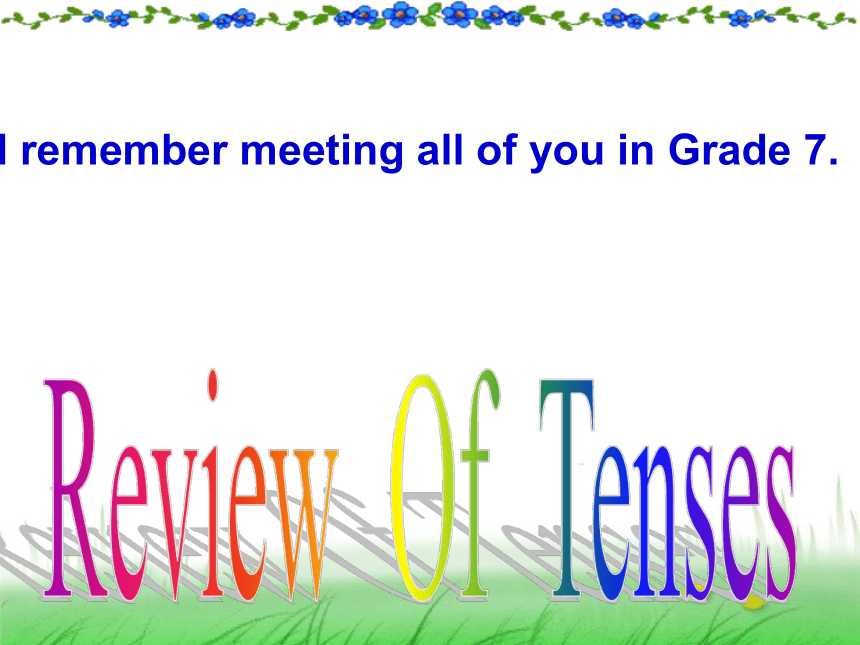 | |
| 格式 | ppt | ||
| 文件大小 | 701.0KB | ||
| 资源类型 | 教案 | ||
| 版本资源 | 人教新目标(Go for it)版 | ||
| 科目 | 英语 | ||
| 更新时间 | 2023-03-20 08:07:26 | ||
图片预览

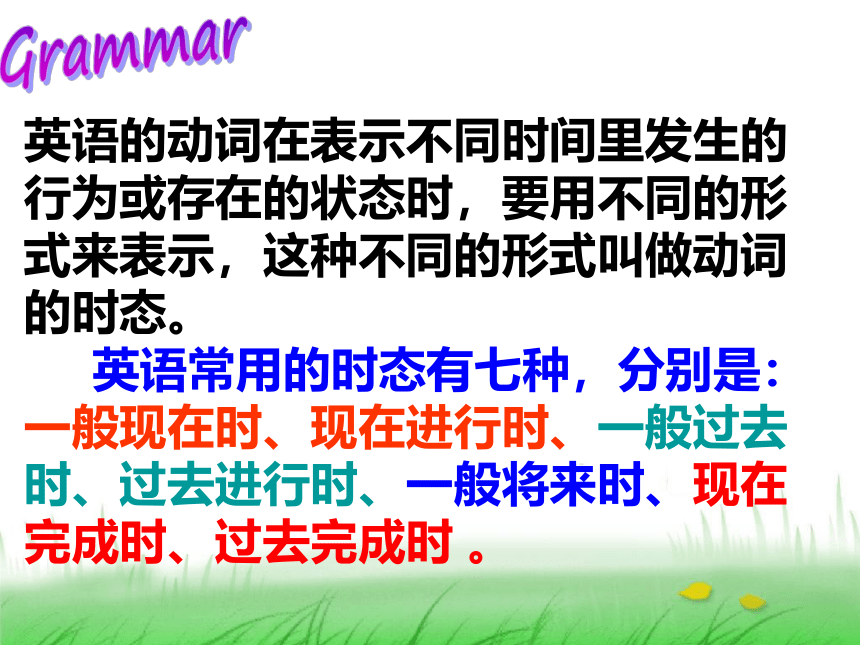
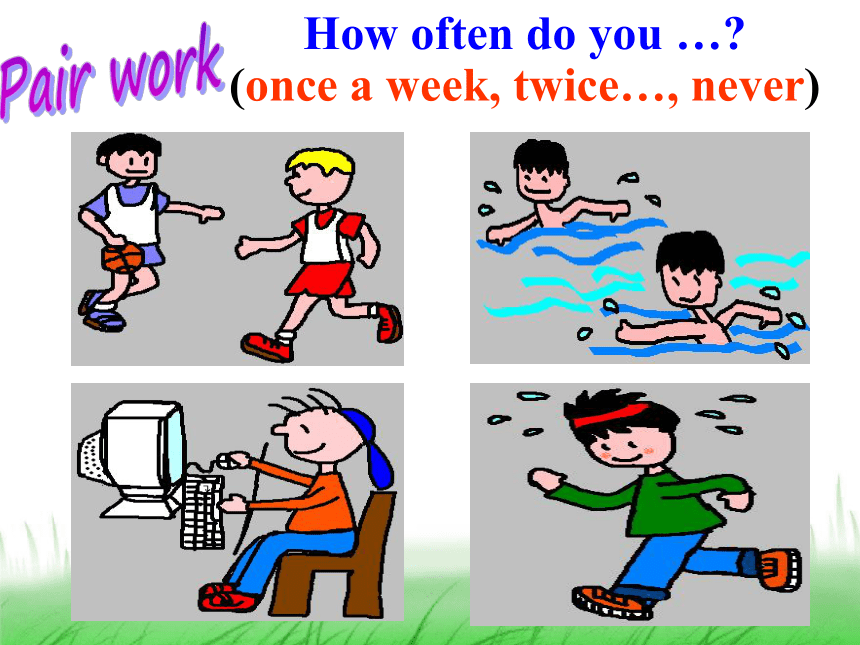
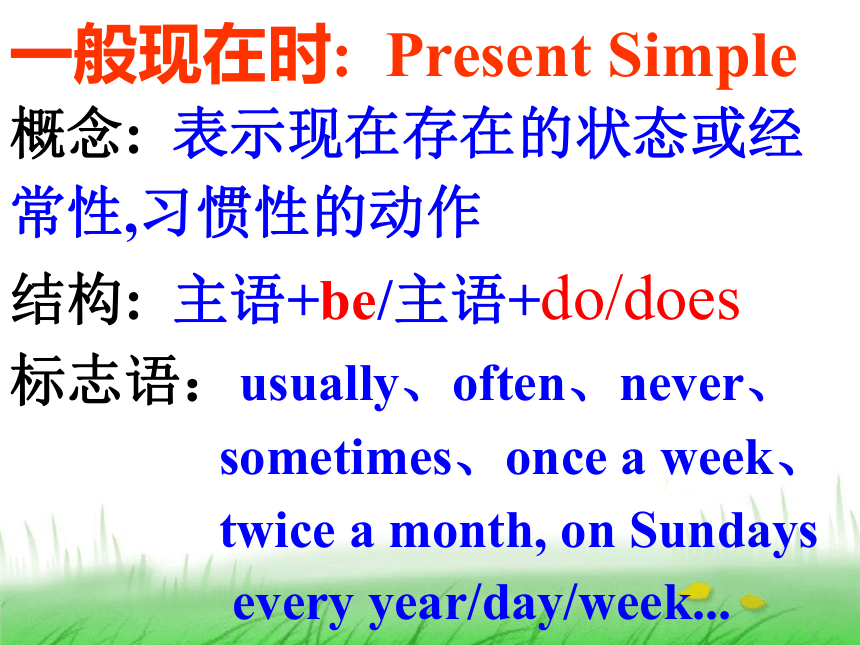
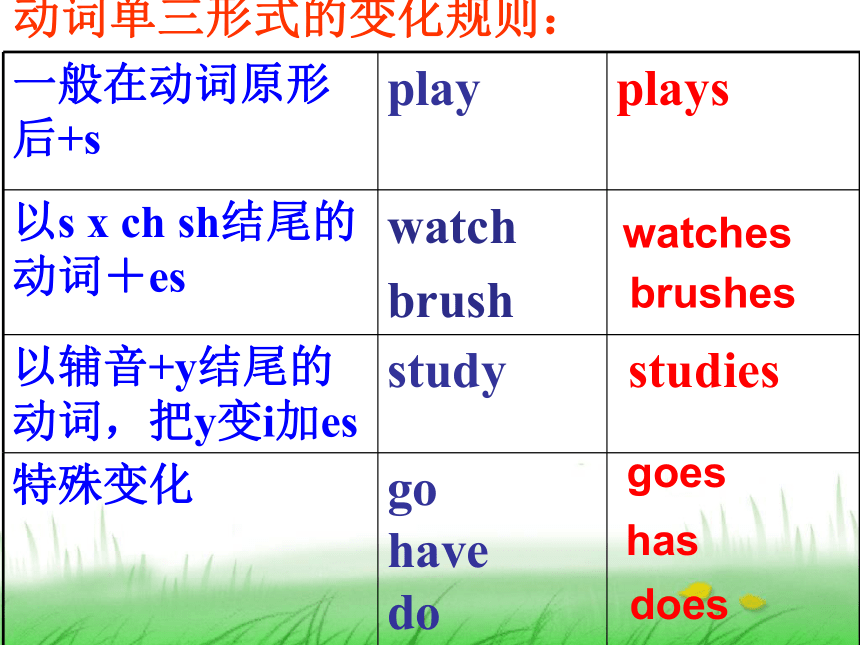
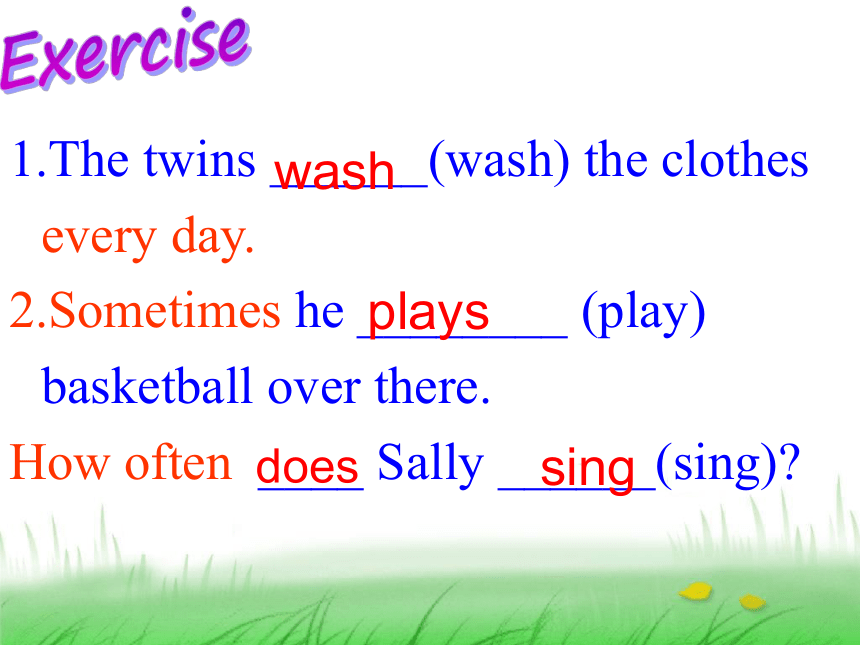
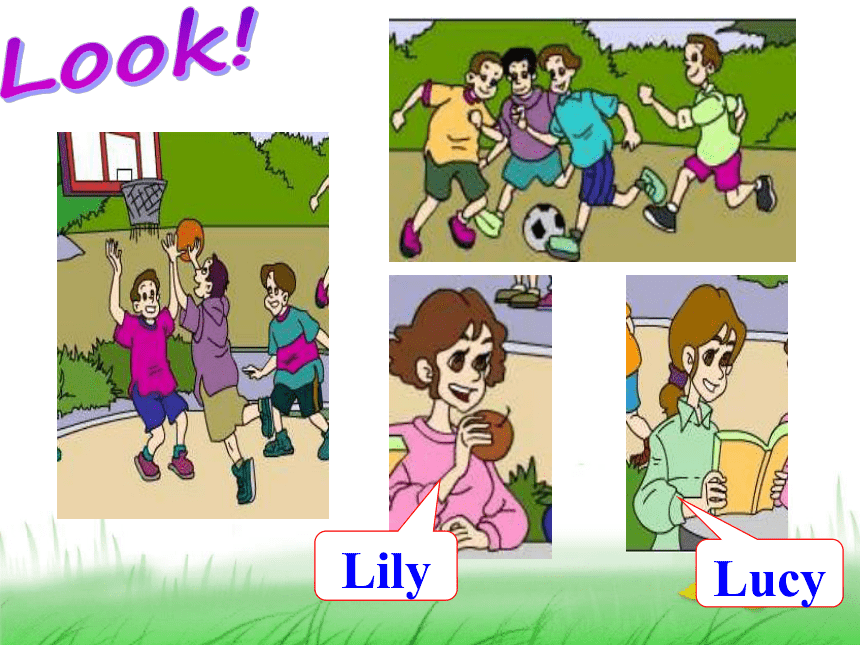
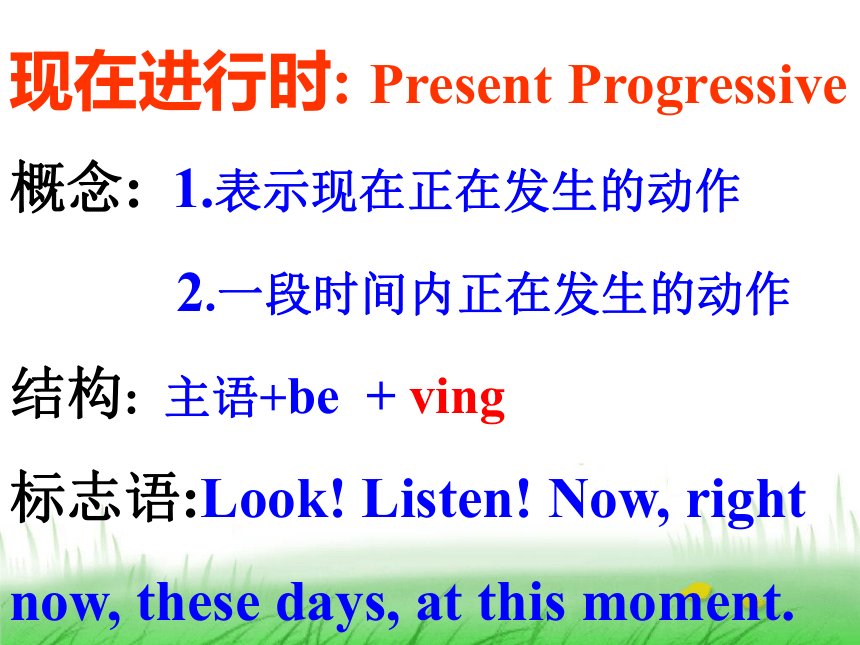
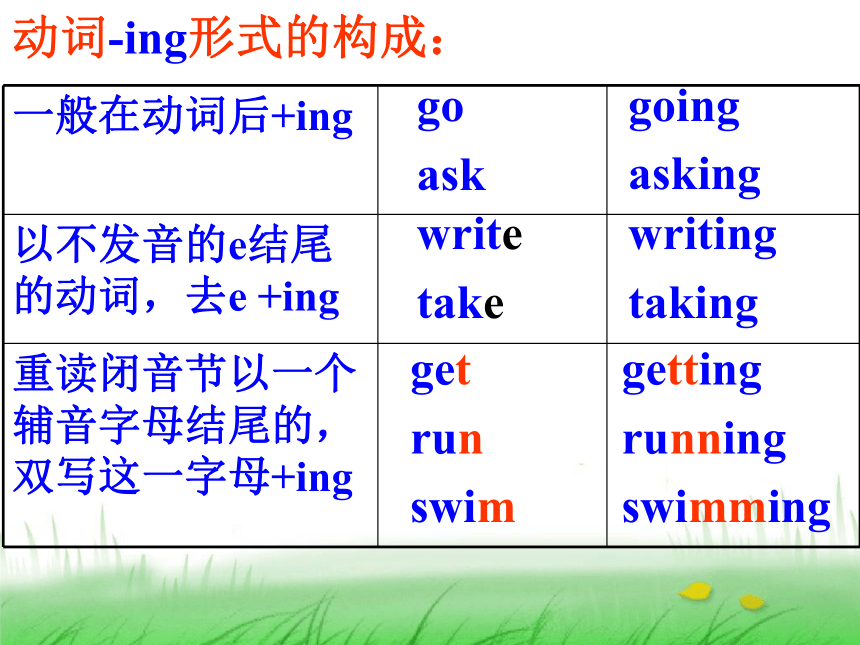
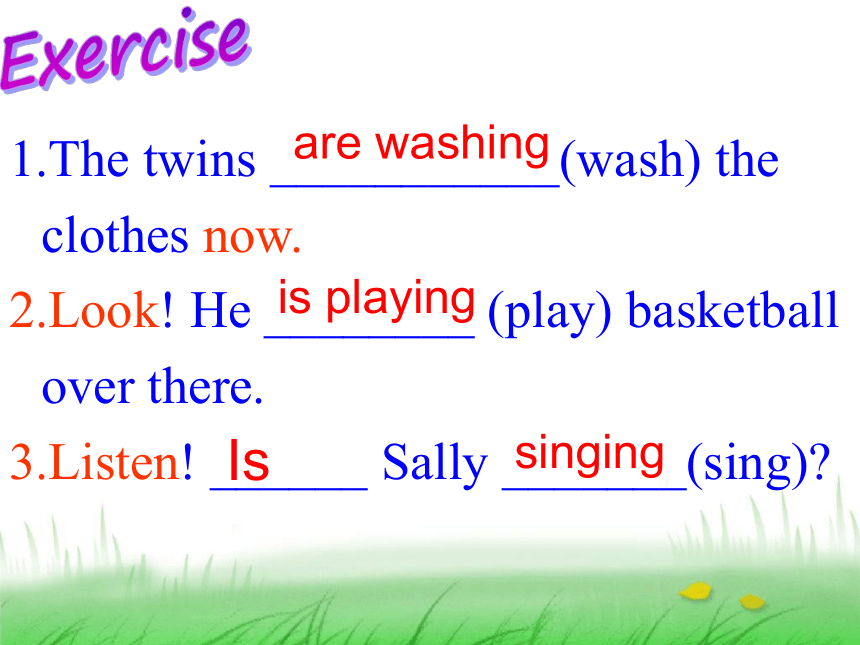
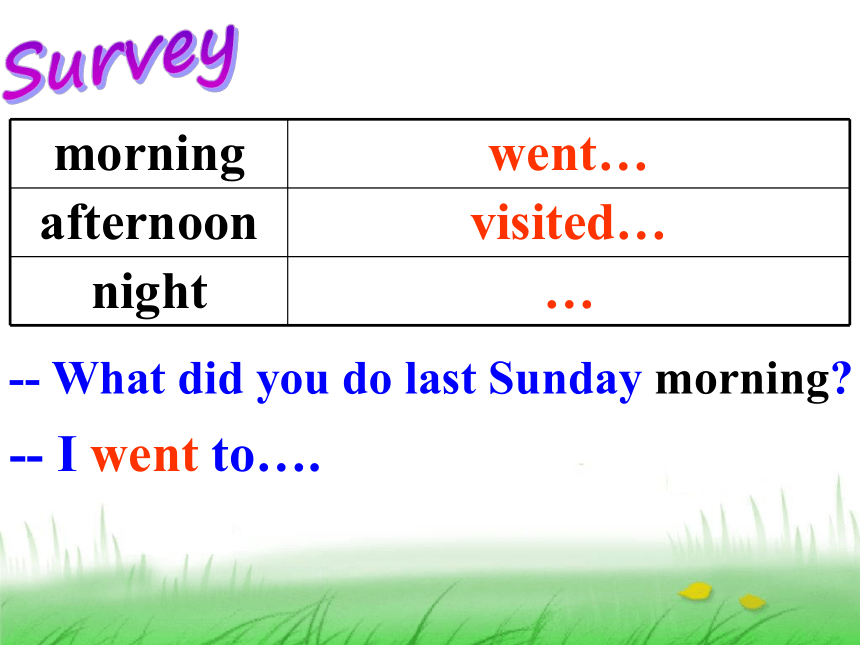
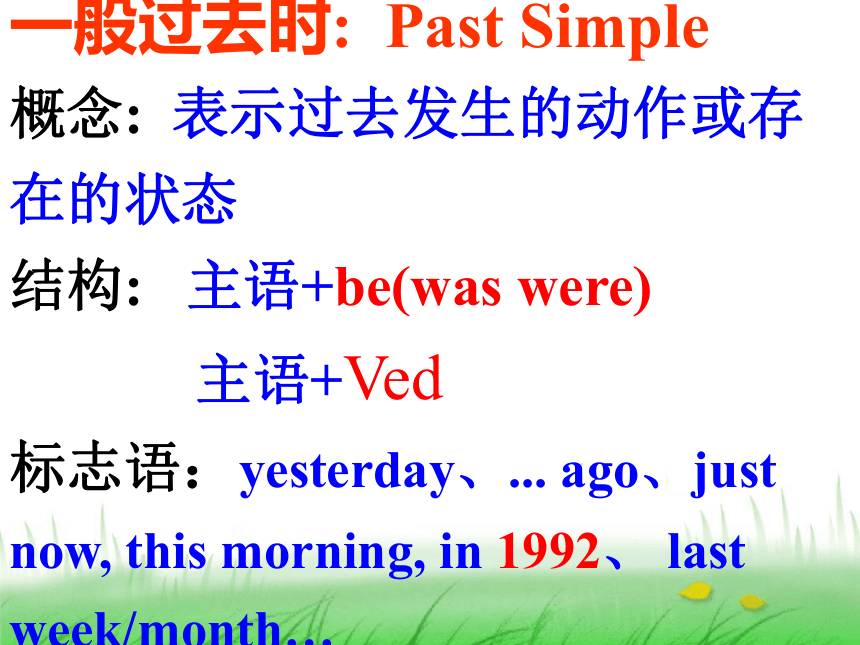
文档简介
(共36张PPT)
I remember meeting all of you in Grade 7.
英语的动词在表示不同时间里发生的行为或存在的状态时,要用不同的形式来表示,这种不同的形式叫做动词的时态。
英语常用的时态有七种,分别是:一般现在时、现在进行时、一般过去时、过去进行时、一般将来时、现在完成时、过去完成时 。
How often do you …
(once a week, twice…, never)
一般现在时: Present Simple
概念: 表示现在存在的状态或经常性,习惯性的动作
结构: 主语+be/主语+do/does
标志语:usually、often、never、
sometimes、once a week、
twice a month, on Sundays
every year/day/week...
一般在动词原形后+s play plays
以s x ch sh结尾的动词+es watch
brush
以辅音+y结尾的动词,把y变i加es study studies
特殊变化
go
have
do
动词单三形式的变化规则:
goes
has
does
watches
brushes
The twins ______(wash) the clothes every day.
Sometimes he ________ (play) basketball over there.
How often ____ Sally ______(sing)
wash
plays
does
sing
Lily
Lucy
现在进行时: Present Progressive
概念: 1.表示现在正在发生的动作
2.一段时间内正在发生的动作
结构: 主语+be + ving
标志语:Look! Listen! Now, right now, these days, at this moment.
一般在动词后+ing
以不发音的e结尾的动词,去e +ing
重读闭音节以一个辅音字母结尾的,双写这一字母+ing
动词-ing形式的构成:
writing
taking
getting
running
swimming
going
go
ask
write
take
get
run
swim
asking
The twins ___________(wash) the clothes now.
Look! He ________ (play) basketball over there.
Listen! ______ Sally _______(sing)
are washing
is playing
Is
singing
-- What did you do last Sunday morning
-- I went to….
morning went…
afternoon visited…
night …
一般过去时: Past Simple
概念: 表示过去发生的动作或存在的状态
结构: 主语+be(was were)
主语+Ved
标志语:yesterday、... ago、just now, this morning, in 1992、 last week/month…
动词-ed形式的构成:
在动词后加-ed
以字母e 结尾的动词,只+d
“ 辅音字母+y ” ,变y 为i, 再+ed
重读闭音节以一个辅音字母结尾的,双写+ed
want
answer
move
die
carry
cry
stop
plan
wanted
moved
died
carried
cried
stopped
planned
answered
got
drank
took
went
swam
ate
cut
were
had
did
came
said
saw
put
get take
go swim
eat drink
are have
do come
cut put
say see
Lucy __(be) a teacher 5years ago.
The day before yesterday he ________ (play) basketball over there.
3._____ Sally ______(sing) two hours ago
was
played
Did
sing
过去进行时: Past Progressive
概念: 1表示过去某一时刻正在发生的动作2表示过去一段时间内正在发生的动作
结构: 主语+was/were+ ving
标志语:at 8:00 yesterday ,at that time/moment. At this time yesterday, from 9 to10 last night. When 主 did
过去进行时: Past Progressive
2.What were you doing when I called you yesterday
I_______ (read) a book when you called me
1.They _________(have) a meeting from 9 to10 last night.
were having
was reading
一般将来时: Future Simple
概念: 表示将要发生的动作
结构: 主语+will +V原
主语+be going to
标语:tomorrow, next week , in 2 days, in 2020 ,this evening, soon
一般将来时: Future Simple
1.People ________(have) robots in their homes in 20 years.
2.There ________(be) a sports meeting next week.
will have
is going to be
-- Have you packed … yet
-- Yes, I have packed ….
No, I haven’t …
pack the towels √
pack the camera X
… …
water the plants √
现在完成时: Present Perfect
概念1: 表示过去发生的动作对现在造成的影响
结构: 主语+ have/ has V过分
标志语:already, yet, ever, never, just, before, so far, in the last few years.
现在完成时: Present Perfect
概念2: 表示动作发生在过去一直持续到现在,有可能持续到将来
结构: 主语+ have/ has+ V过分
标志语:for 5 years, since 5 years ago, since 2010,since I was a kid.
现在完成时: 特殊用法
概念:1.表示曾经去过某地人在这
have/has been to +地
2.表示去了某地人不在这
have/has gone to +地
3表示在某地呆多长时间
have/has been in +地+for 一段时间
get
go
eat
are
do
cut
say
got gotten
went gone
ate eaten
cut cut
were been
did done
said said
take
swim
drink
have
come
put
see
took taken
swam swum
drank drunk
put put
had had
came come
saw seen
The twins ___________(wash) the clothes for an hour.
He ________ (play) basketball since three years ago.
3.I_______ (not see)this film yet.
4 Mr Li isn’t here. He ______ Shanghai.
have washed
has played
haven't seen
has gone to
1. I usually____ (get) up at 6:00, but yesterday I ___ (get) up at 7:00, and tomorrow I___ (get) up at 6:30.
2. Listen! Someone ___(knock) at the door.
3. He fell asleep while he___(read) a book.
4. she often ___(go) for walks last summer
5.What ______he ______(do) when his mother opened the door
6. Tom _______(work) there since two years ago.
过去完成时
概念: 表示在过去某一时刻前已经完成的动作。过去的过去。
结构: 主语+had + Ved
标志语: by the end of last year.
by the time. before+过去的时间点.
1.By the time I got up, my mother _______(cook) breakfast.
2.By the end of last term I____ (learn) 500words.
had cooked
had learned
过去完成时
宾语从句中当主句是过去时。从句过去完成时。
He said he had seen the film.
过去完成时
宾语从句中当主句是过去时。从句过去完成时。
He said he had seen the film.
1. I usually____ (get) up at 6:00, but yesterday I ___ (get) up at 7:00, and tomorrow I___ (get) up at 6:30.
2. Listen! Someone ___(knock) at the door.
3. I ___(be) in Beijing for two years.
4. How often __Andy ___(surf) the Internet
5. He fell asleep while he ___(read) a book.
6. I ___never ____(hear) of that man before.
7. she often ___(go) for walks last summer.
8. What ______he ______(do) when his mother opened the door
9. If it _____(not rain) tomorrow, they ____(go) fishing.
10. _____Kate's sisters ____(play) the piano every Sunday
11. They_____ (not call) you the day after tomorrow.
12. Tom _______(work) there since two years ago.
13. By the time I ________ (arrive), the teacher __________ (start) the class.
Composition: I
(你的过去、现在和将来)
Write an article about yourself, tell us your past、your present and your future.
I remember meeting all of you in Grade 7.
英语的动词在表示不同时间里发生的行为或存在的状态时,要用不同的形式来表示,这种不同的形式叫做动词的时态。
英语常用的时态有七种,分别是:一般现在时、现在进行时、一般过去时、过去进行时、一般将来时、现在完成时、过去完成时 。
How often do you …
(once a week, twice…, never)
一般现在时: Present Simple
概念: 表示现在存在的状态或经常性,习惯性的动作
结构: 主语+be/主语+do/does
标志语:usually、often、never、
sometimes、once a week、
twice a month, on Sundays
every year/day/week...
一般在动词原形后+s play plays
以s x ch sh结尾的动词+es watch
brush
以辅音+y结尾的动词,把y变i加es study studies
特殊变化
go
have
do
动词单三形式的变化规则:
goes
has
does
watches
brushes
The twins ______(wash) the clothes every day.
Sometimes he ________ (play) basketball over there.
How often ____ Sally ______(sing)
wash
plays
does
sing
Lily
Lucy
现在进行时: Present Progressive
概念: 1.表示现在正在发生的动作
2.一段时间内正在发生的动作
结构: 主语+be + ving
标志语:Look! Listen! Now, right now, these days, at this moment.
一般在动词后+ing
以不发音的e结尾的动词,去e +ing
重读闭音节以一个辅音字母结尾的,双写这一字母+ing
动词-ing形式的构成:
writing
taking
getting
running
swimming
going
go
ask
write
take
get
run
swim
asking
The twins ___________(wash) the clothes now.
Look! He ________ (play) basketball over there.
Listen! ______ Sally _______(sing)
are washing
is playing
Is
singing
-- What did you do last Sunday morning
-- I went to….
morning went…
afternoon visited…
night …
一般过去时: Past Simple
概念: 表示过去发生的动作或存在的状态
结构: 主语+be(was were)
主语+Ved
标志语:yesterday、... ago、just now, this morning, in 1992、 last week/month…
动词-ed形式的构成:
在动词后加-ed
以字母e 结尾的动词,只+d
“ 辅音字母+y ” ,变y 为i, 再+ed
重读闭音节以一个辅音字母结尾的,双写+ed
want
answer
move
die
carry
cry
stop
plan
wanted
moved
died
carried
cried
stopped
planned
answered
got
drank
took
went
swam
ate
cut
were
had
did
came
said
saw
put
get take
go swim
eat drink
are have
do come
cut put
say see
Lucy __(be) a teacher 5years ago.
The day before yesterday he ________ (play) basketball over there.
3._____ Sally ______(sing) two hours ago
was
played
Did
sing
过去进行时: Past Progressive
概念: 1表示过去某一时刻正在发生的动作2表示过去一段时间内正在发生的动作
结构: 主语+was/were+ ving
标志语:at 8:00 yesterday ,at that time/moment. At this time yesterday, from 9 to10 last night. When 主 did
过去进行时: Past Progressive
2.What were you doing when I called you yesterday
I_______ (read) a book when you called me
1.They _________(have) a meeting from 9 to10 last night.
were having
was reading
一般将来时: Future Simple
概念: 表示将要发生的动作
结构: 主语+will +V原
主语+be going to
标语:tomorrow, next week , in 2 days, in 2020 ,this evening, soon
一般将来时: Future Simple
1.People ________(have) robots in their homes in 20 years.
2.There ________(be) a sports meeting next week.
will have
is going to be
-- Have you packed … yet
-- Yes, I have packed ….
No, I haven’t …
pack the towels √
pack the camera X
… …
water the plants √
现在完成时: Present Perfect
概念1: 表示过去发生的动作对现在造成的影响
结构: 主语+ have/ has V过分
标志语:already, yet, ever, never, just, before, so far, in the last few years.
现在完成时: Present Perfect
概念2: 表示动作发生在过去一直持续到现在,有可能持续到将来
结构: 主语+ have/ has+ V过分
标志语:for 5 years, since 5 years ago, since 2010,since I was a kid.
现在完成时: 特殊用法
概念:1.表示曾经去过某地人在这
have/has been to +地
2.表示去了某地人不在这
have/has gone to +地
3表示在某地呆多长时间
have/has been in +地+for 一段时间
get
go
eat
are
do
cut
say
got gotten
went gone
ate eaten
cut cut
were been
did done
said said
take
swim
drink
have
come
put
see
took taken
swam swum
drank drunk
put put
had had
came come
saw seen
The twins ___________(wash) the clothes for an hour.
He ________ (play) basketball since three years ago.
3.I_______ (not see)this film yet.
4 Mr Li isn’t here. He ______ Shanghai.
have washed
has played
haven't seen
has gone to
1. I usually____ (get) up at 6:00, but yesterday I ___ (get) up at 7:00, and tomorrow I___ (get) up at 6:30.
2. Listen! Someone ___(knock) at the door.
3. He fell asleep while he___(read) a book.
4. she often ___(go) for walks last summer
5.What ______he ______(do) when his mother opened the door
6. Tom _______(work) there since two years ago.
过去完成时
概念: 表示在过去某一时刻前已经完成的动作。过去的过去。
结构: 主语+had + Ved
标志语: by the end of last year.
by the time. before+过去的时间点.
1.By the time I got up, my mother _______(cook) breakfast.
2.By the end of last term I____ (learn) 500words.
had cooked
had learned
过去完成时
宾语从句中当主句是过去时。从句过去完成时。
He said he had seen the film.
过去完成时
宾语从句中当主句是过去时。从句过去完成时。
He said he had seen the film.
1. I usually____ (get) up at 6:00, but yesterday I ___ (get) up at 7:00, and tomorrow I___ (get) up at 6:30.
2. Listen! Someone ___(knock) at the door.
3. I ___(be) in Beijing for two years.
4. How often __Andy ___(surf) the Internet
5. He fell asleep while he ___(read) a book.
6. I ___never ____(hear) of that man before.
7. she often ___(go) for walks last summer.
8. What ______he ______(do) when his mother opened the door
9. If it _____(not rain) tomorrow, they ____(go) fishing.
10. _____Kate's sisters ____(play) the piano every Sunday
11. They_____ (not call) you the day after tomorrow.
12. Tom _______(work) there since two years ago.
13. By the time I ________ (arrive), the teacher __________ (start) the class.
Composition: I
(你的过去、现在和将来)
Write an article about yourself, tell us your past、your present and your future.
同课章节目录
- Unit 1 How can we become good learners.
- Section A
- Section B
- Unit 2 I think that mooncakes are delicious!
- Section A
- Section B
- Unit 3 Could you please tell me where the restroom
- Section A
- Section B
- Unit 4 I used to be afraid of the dark.
- Section A
- Section B
- Unit 5 What are the shirts made of?
- Section A
- Section B
- Review of Units 1-5
- Unit 6 When was it invented?
- Section A
- Section B
- Unit 7 Teenagers should be allowed to choose their
- Section A
- Section B
- Unit 8 It must belong to Carla.
- Section A
- Section B
- Unit 9 I like music that I can dance to.
- Section A
- Section B
- Unit 10 You're supposed to shake hands.
- Section A
- Section B
- Review of Units 6-10
- Unit 11 Sad movies make me cry.
- Section A
- Section B
- Unit 12 Life is full of the unexpected
- Section A
- Section B
- Unit 13 We're trying to save the earth!
- Section A
- Section B
- Unit 14 I remember meeting all of you in Grade 7.
- Section A
- Section B
- Review of Units 11-14
